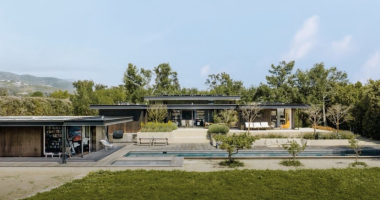And while the 19-year old is now safe in Sydney, he said he’s still suffering – because he had to leave his beloved mother behind.
Mahdi and his family rushed to Kabul Airport after being warned the nation was about to fall.

His older brother has Australian citizenship, so the family was able to get on a plane to safety.
But in the chaos, his mother and brother became separated from the rest of the family.
“We were so shocked and so upset,” he said.
“I asked my brother, ‘I wanna go back and join my mum’, but my brother wouldn’t let me.

“He said, ‘the Taliban’s going to kill you, I want to take you out of Kabul.”
“It was so bad. I was shocked.”
He is now living in Blacktown in Sydney’s West, and has been helped, with the rest of his family by Settlement Services International.
And while he said he loves Australia, and would eventually like to study business management at university, he said it is hard to think about anything without his mother with him.
He’s only able to talk to her every couple of weeks or so, and it’s an upsetting ordeal.

“My mum cries from that side, and me and my two sisters cry from here,” he said.
“There is nothing, my brother isn’t working as there is no jobs.
“My mum can’t go out of the house, because of the Taliban.”
The family is trying to get his mother over to Australia, but it’s a long process.
Mahdi’s older brother in Australia sends her money, and they all desperately want to get her to safety.
But life in Afghanistan is dangerous, and difficult, especially for women.

The number of Afghans living below the poverty line is rapidly approaching 97 per cent of the population, the head of the United Nations Development Program, Achim Steiner, warns earlier this year.

SSI says it has helped 1400 Afghans to make NSW their new home since August 2021.
That includes everything from enrolling kids in school, finding them a place to live, and signing up for English classes.
But it says almost two-thirds of refugees it has helped reported at least some of their immediate family members were overseas, mostly siblings, parents and children.
And a survey found that reuniting with family is a crucial issue for refugees, while worry about family overseas is a significant stressor in everyday life, with COVID-19 also exacerbating the difficulties of family separation.
“We found that being separated from immediate family is a strong predictor for weaker social bonds among newly arrived refugees,” Yamamah Agha, SSI’s General Manager Newcomers, Settlement and Integration, said,
“For example, they were connecting less with family and friends and feeling less supported.”

Australia plans to offer visas to 31,500 Afghanis over the next four years, Home Affairs said.
In 2021-22, more than 5,300 Humanitarian visas were granted to Afghan nationals with more than 5500 arriving in Australia since August last year.
However, the government admitted more than 47,900 humanitarian visa applications have been lodged in Australia by or on behalf of Afghan nationals and remain undecided, comprising of more than 211,100 applicants.
“The Australian Government remains committed to supporting the Afghan community at this distressing time,” a Home Affairs spokesman, said.








